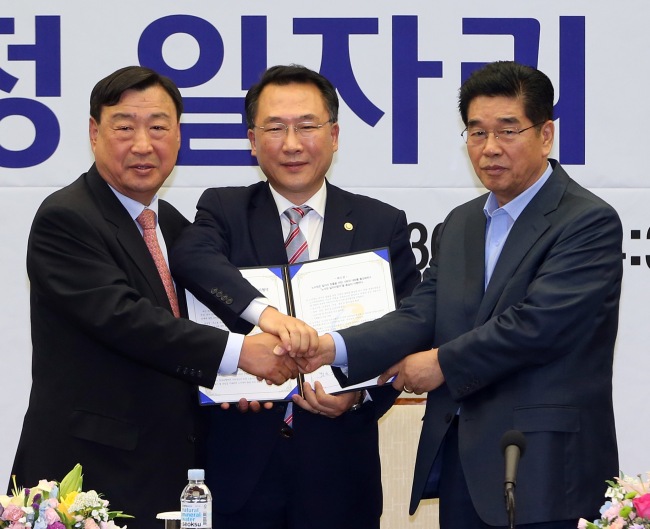 |
방하남(가운데) 고용노동부 장관이 30일 오후 서울 중구 프레스센터에서 열린 노ㆍ사ㆍ정 일자리 협약식에서 이희범 한국경영자총협회 회장(왼쪽), 문진국 한국노동조합총연맹 위원장과 협약서에 서명한 뒤 기념촬영하고 있다. (연합뉴스) |
<관련 영문 기사>
Top labor panel agrees on wage peak system, job-sharing
By Cho Chung-un
A tripartite body of labor, business and government reached an agreement Thursday to create more quality part-time jobs and implement a wage peak system in a concerted effort to expand employment opportunities for the young and the senior citizens.
The landmark agreement is expected to pave way for President Park Geun-hye’s campaign pledge to raise the nation’s employment rate to 70 percent by 2017 from the present 59.8 percent.
The labor panel has decided to work together to reduce work hours, place a wage limit on high-income earners and improve work conditions for irregular workers and employees hired by subcontractors. Representatives also agreed on the government’s new regulation that obligates public corporations to hire young workers to fill at least 3 percent of their workforce. Private businesses will also be encouraged to adopt the 3 percent-quota system, the panel said during a signing ceremony of the labor agreement. The ceremony was attended by the three representatives – Labor Minister Phang Ha-nam, Korea Employers Federation Chairman Lee Hee-beom and Moon Jin-guk, president of the Federation of Korean Trade Unions.
“The three parties have taken a significant step to solve one of the major problems in our society in times of global economic depression and sluggish low growth rate,” labor minister said. Phang added that the agreement failed to add the controversial issue of ordinary pay because it is a “highly sensitive subject.”
Last week, the minister proposed tripartite talks to resolve the continuing controversy over the scope of “ordinary wages.” The controversy revolves around whether quarterly bonuses constitute part of workers’ ordinary wages.
To accelerate the job-sharing scheme, the government first plans to create public-sector part-time jobs for the next five years and encourage businesses to join the move.
To facilitate the implementation of the government’s plan to extend the retirement age to 60 starting 2016, the panel agreed to overhaul the current wage structure and adopt a wage peak system to help companies reduce financial burden from the extended retirement age. To this, the labor and the business said they will cooperate to revise some of collective bargaining codes and to help workers those who retire before the government implements extension of retirement age. Businesses are encouraged to consider placing a wage ceiling for highly paid executives so that they could hire more young employees or improve work condition for irregular workers.
Businesses also agreed to increase the number of temporary workers granted with regular job status in line with the government’s plan. By 2015, the government will expand its plan for granting regular job status to contract workers in public workplaces. Tax incentives and institutional favors will be offered to businesses those participate in improving the new labor rules.
(christory@heraldcorp.com)



![[Herald Interview] 'Trump will use tariffs as first line of defense for American manufacturing'](http://res.heraldm.com/phpwas/restmb_idxmake.php?idx=644&simg=/content/image/2024/11/26/20241126050017_0.jpg)

![[Health and care] Getting cancer young: Why cancer isn’t just an older person’s battle](http://res.heraldm.com/phpwas/restmb_idxmake.php?idx=644&simg=/content/image/2024/11/26/20241126050043_0.jpg)

